Freezing Foods – How Long Do They Last?
This post may contain affiliate links. Read our disclosure policy here.
Do you plan on freezing foods so that you can build up your stockpile? Here’s a simple list of how long foods can last in the freezer.
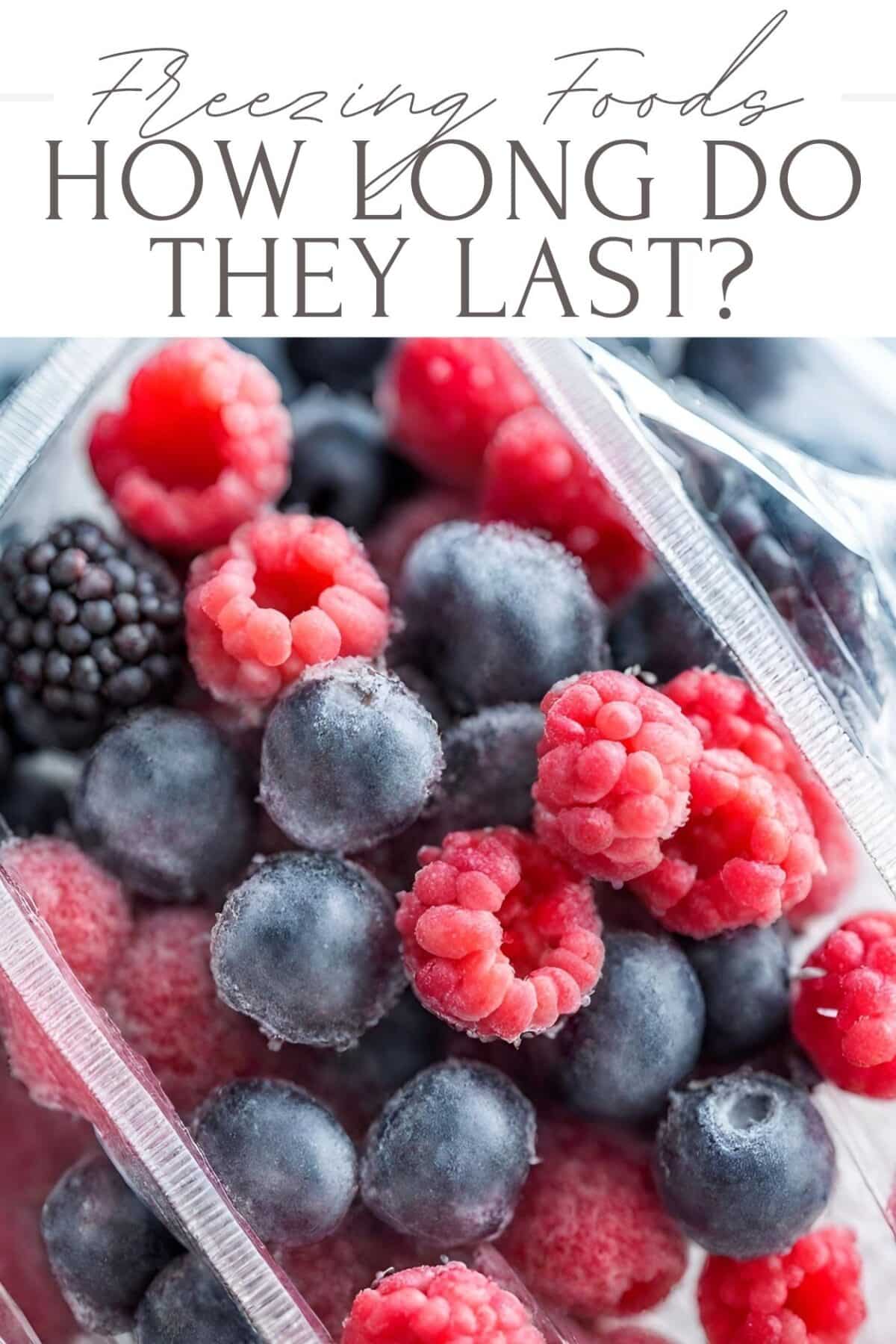
How Long Does Food Last in the Freezer?
I had a question a while back about storing certain foods in the freezer, and I thought I’d type up a list of how long foods can last in the freezer. I’m also including a handy “How Long Will It Freeze” printable at the bottom of this post.
As my freezer becomes a treasure trove of future meals, I can’t help but wonder – how long can these frozen foods truly last? This question of freezer time brought me to create this helpful article, just for those keen on savoring your home-preserved foods far beyond their fresh-by date.
Freezing is a marvel of modern food preservation that suspends time and locks in taste and nutrition if done right. But just how long does chicken last in the freezer, or for how long can ground beef be frozen before its quality diminishes? From the humble veggies and fruits to fine cuts of beef and poultry, each item enters your freezer with a different amount of time to stay before it expires.
And what happens if you lose power in your freezer? In this article, I’ll also answer how long food lasts in the freezer without power.
Keep reading for a simple list detailing the shelf life of frozen goods.
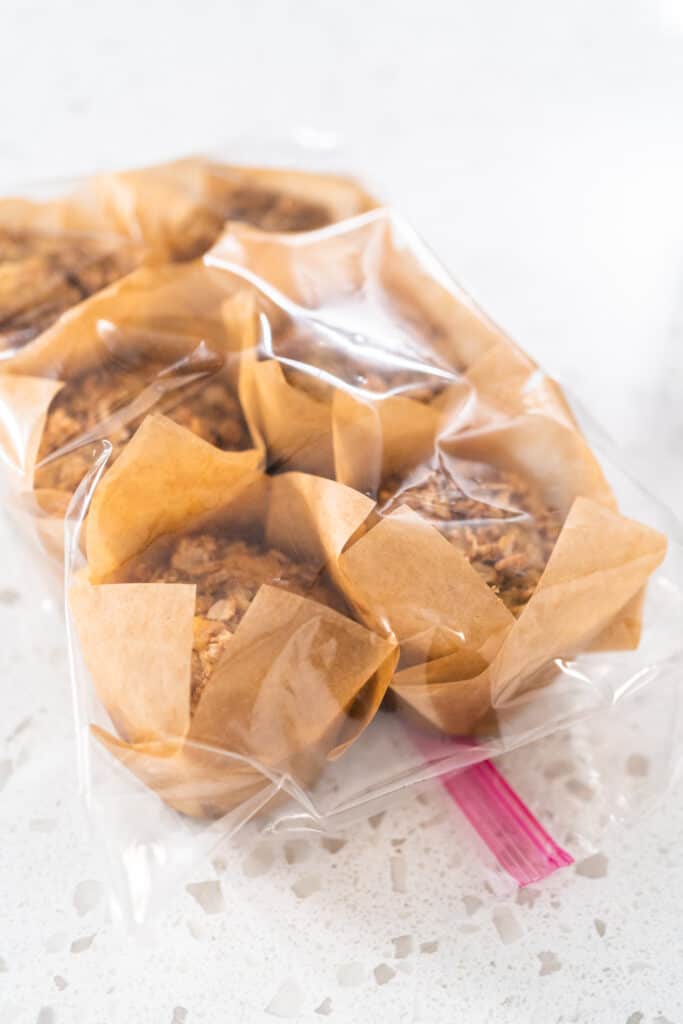
Personal Freezing Stories
I remember the days when I first started freezing extra foods so save them for later. I would put chicken broth in glass jars filled to the top, only to find broken glass all over my freezer when I opened it again. But this frosty flop taught me a valuable lesson about leaving space for expansion, and now I can pass this wisdom on when chatting with friends about the art of freezing food.
But not all of my freezing adventures have ended with cleaning up glass from the bottom of the freezer; I’ve been able to freeze many items successfully without freezer burn over the years since I’ve learned from my mistakes.
Power outages have tested my food preservation skills. Have you ever wondered how long food lasts in the freezer without power? Well, I can tell you. It’s all about insulating with blankets and praying for the best. I’ve been lucky that my carefully-packed, separated meats and veggies prevailed without so much as a thaw.
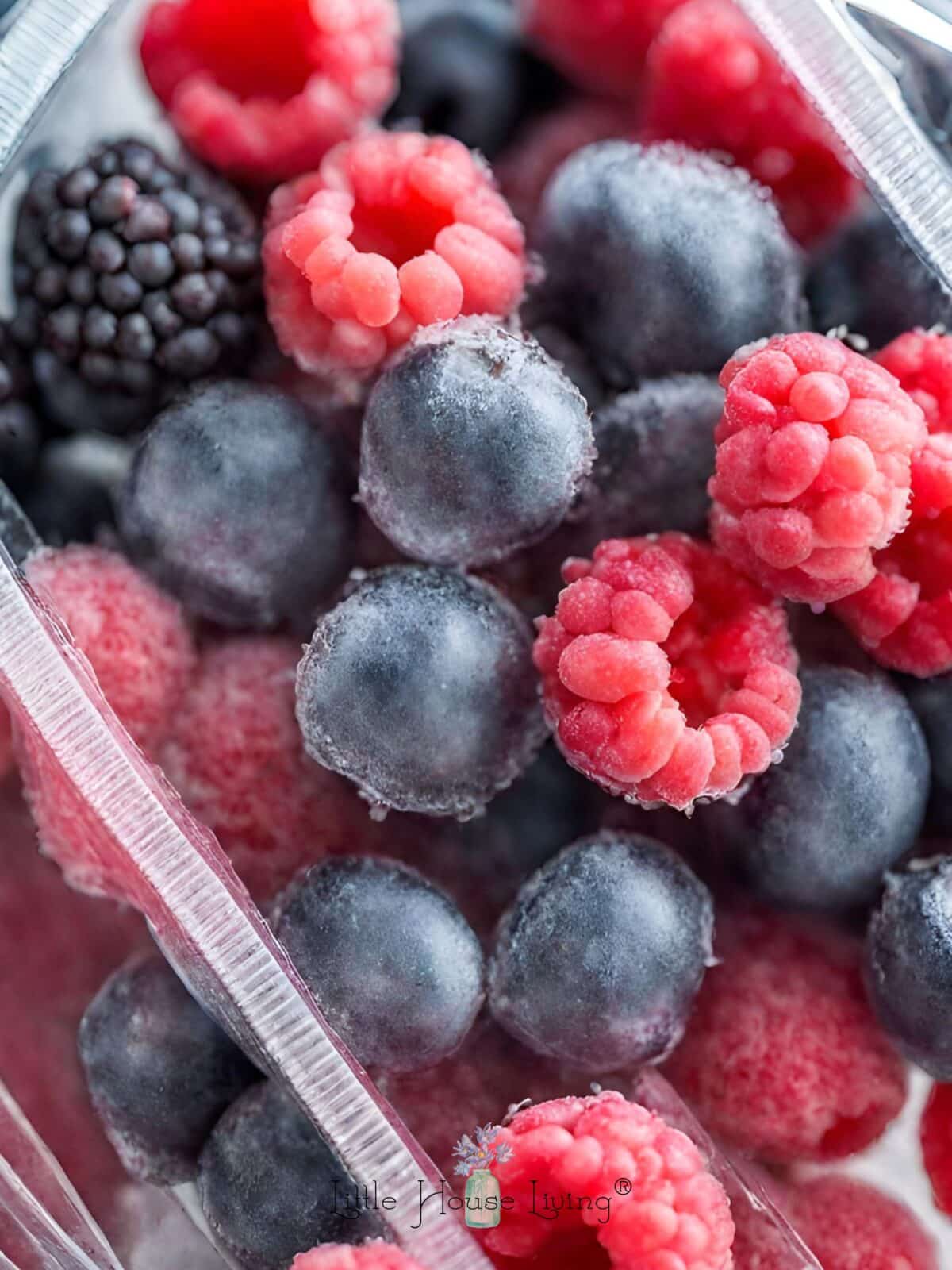
The Science of Freezing Food
Before we dive into how long certain items last in the freezer, let’s take a chilly dip into a little food science first.
Freezing food is like hitting the pause button on biological time. And why is that? It’s because the deep freeze halts the bacteria and enzymes that usually lead to spoilage and decay. Water molecules inside your food crystallize and form ice. This ice crystal stays solid so as not to let typical spoilage proceed.
Not all ice is the friendly kind. Yes, I’m looking at your freezer burn! When food’s in the freezer longer than it should be, evaporation might coax moisture out, and the freezer burn happens—freezer burn results in a flat flavor and an unappealing texture.
So there you have it, a frosty foray into the science of freezing food and how it keeps what you eat edible, often much longer than Mother Nature intended – if you can beat the bite of freezer burn.
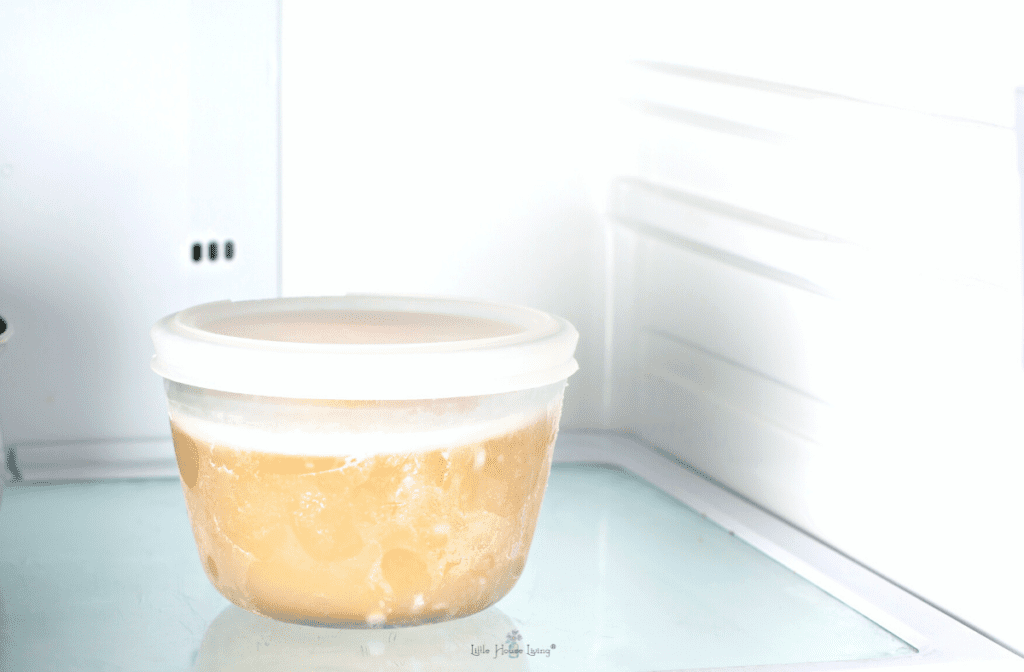
Freezer Guidelines
As someone who’s navigated the confusing terrain of freezer storage, I’ve learned that leaning on official guidelines keeps your frozen treasure trove safe and nutritious. So, let’s dive into the ice-cold facts from reputable sources like the USDA and FDA.
Whether or not you agree with everything these entities put out, since they’ve done more research into the science behind freezing than we can in our lifetimes, we can glean good information from what they have to say.
Frozen foods will remain safe indefinitely if they are properly frozen. However, quality does decline, so they’ve mapped out optimal timelines for maintaining peak flavors and textures.
For instance, did you know that freezing chicken can differ depending on the cut you are freezing? Whole chickens can be good for a year, but those cuts like boneless things and breasts should be used within nine months for prime taste.
The same goes for freezing beef. Steaks can handle the cold for 6 to 12 months, while ground beef shouldn’t push past 4 months.
And let’s not forget about our plant friends – when properly prepped, veggies and fruits have a frozen storage capacity of 8 to 12 months. These stats are all based on food science experts who have been able to test these theories thoroughly.
Adhering to frozen food storage guidelines is crucial for efficient food shelf life management.
Remember, keeping your freezer at the food safety-approved 0°F (-18°C) isn’t just recommended; it’s a golden rule. This ensures that no matter how long food lasts in the freezer without power, you’ll mitigate the guesswork in a blackout, as the contents should stay below 40°F for roughly 48 hours – if you keep that door closed! To ensure proper temps in the freezer (and the refrigerator), I recommend getting an Appliance Thermometer for peace of mind.
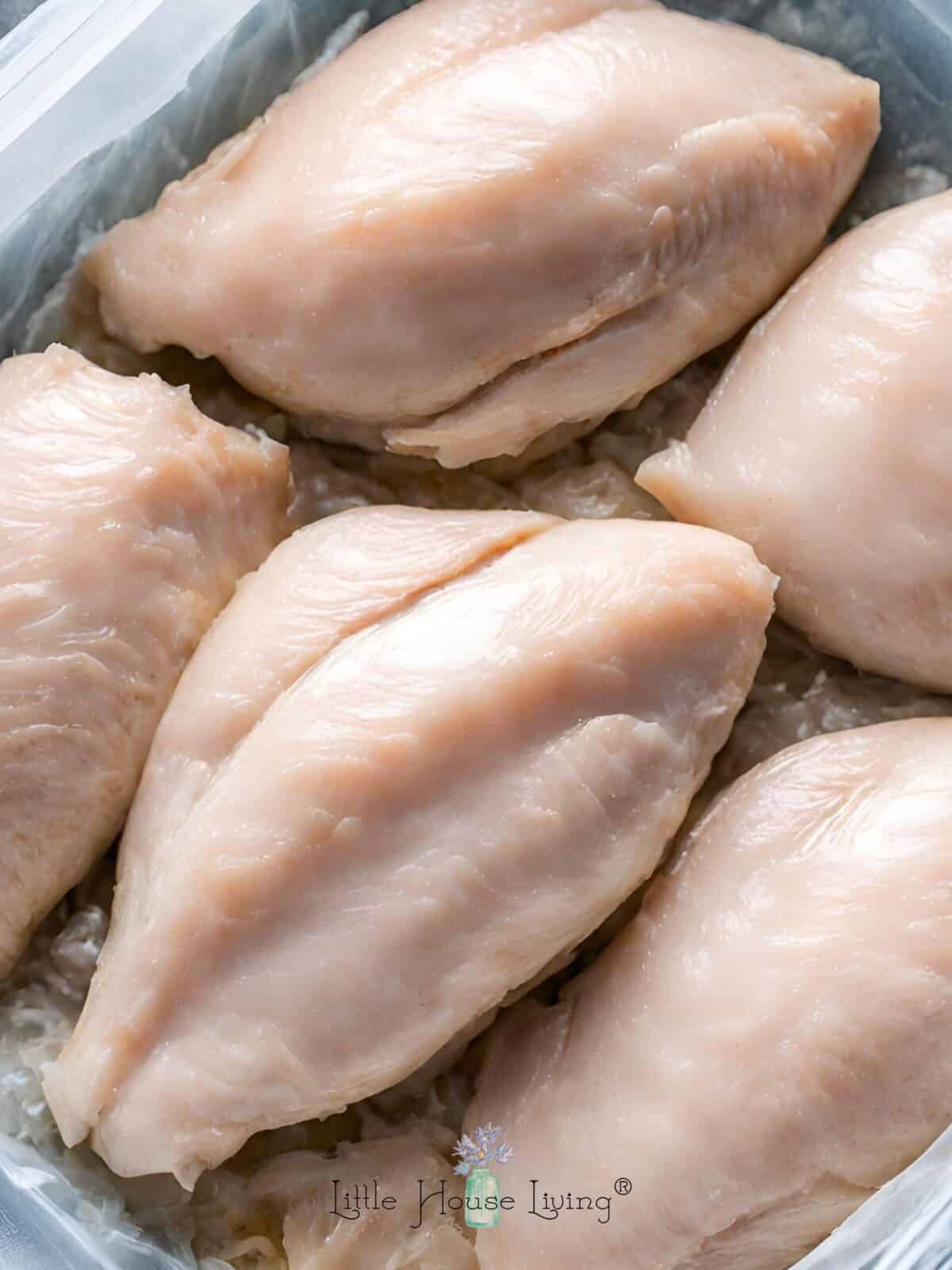
Food-Specific Freezing Times
Here is a list of freezer storage times for various common foods that you might be looking to store. You can get all this in an easy-to-read chart form at the bottom of this blog post.
- Chicken: Chicken can be frozen for up to a year (for all cuts). However, anything past nine months and you might compromise on juiciness. This includes turkey and other game birds.
- Beef: Beef can stay in the freezer for well over a year. Although technically safe beyond that, for the love of savory steaks, aim for no longer than 12 months. Properly packaged beef will last even longer if you are getting a whole cow butchered.
- Ground Beef: Four months is the longest time you should freeze ground beef. Any ground meats tend to last less time in the freezer as they are not as dense as their steak and roast counterparts.
- Pork. All cuts of pork will be best if stored for less than 6 months in the freezer. That includes bacon, sausage, hot dogs, chops, ribs, roasts, ham, etc.
- Whole Fish and Seafood: Most fish can be stored in the freezer for up to 6 months. This includes fish, oysters, shrimp, salmon, lean fish, fatty fish, etc.
- Vegetables: Vegetables can last in the freezer for up to a year, but remember, the quicker you use them, the crispier they’ll be. Vegetables like spinach can also be frozen, but they will change their texture. Some vegetables like broccoli, cauliflower, and carrots freeze very well.
- Fruit: Berries and other fruits will also last up to a year. However, my personal experience says after about eight months, they’re better suited for smoothies than snacking. Bananas and other fresh fruits are among my favorite things to freeze so I can use them in breads and to make jams and jelly later when I have more time.
- Cheese: Block cheeses can freeze comfortably for six months before the texture begins to change and get crumbly. You can also freeze shredded cheese and sliced cheese for the same amount of time. You should be able to successfully freeze both soft cheese and hard cheeses.
- Ice Cream: Indulge within two months for peak creaminess. It will last up to 4 months in the freezer but begins to be icy after the 2-month mark.
- Bread: Stash it for up to three months. After that, it becomes dry and crumbly. This is the same for all breads, muffins, quick breads, pies, cookies, cake, etc.
- Prepared Meals: More freezer meals will last up to 3 months in the freezer before they begin to have texture issues.
- Soups and Stews. These are the same as other freezer meals and will last up to 3 months in the freezer before becoming too crystalized. This includes homemade sauces and condiments.
- Eggs. Eggs should be stored out of their shell in the freezer. You can freeze them in a container together or in individual sizes (frozen in ice cube trays). They will be good for up to one year but best if used before 4 months.
- Dairy. Some dairy, like milk, can be frozen, but it may change the texture. Other dairy items like butter and cream cheese can be easily frozen and used the same way they would have been before freezing. Freeze dairy items for up to 3 months (longer for butter).
Things You Shouldn’t Freeze
Some items shouldn’t be frozen simply because they won’t come out of the freeze with the right texture. This doesn’t mean you CAN’T freeze them; it just means that another method of preservation is preferred.
- Yogurt
- Mayonnaise
- Custard
- Mushrooms
- Herbs
- Sour Cream
- Lettuce
- Cooked Pasta
- Olives
- Cucumbers

Freezing Without Power
Picture this: You’ve just stocked your freezer with all sorts of goodies—beef that could rival a steakhouse, chicken that’s soon to be your famous casserole, veggies waiting for their stir-fry debut.
Then suddenly, there’s no power, no lights, and no electricity to power your freezer and fridge.
The length of time food maintains its safety in a frosty limbo is a pressing question, but here’s the scoop from my own experience and some thorough research.
First off, keep that freezer door firmly shut. Every sneak peek lets out precious cold air. In a complete power shutdown, a full freezer should keep everything safely frozen for about 48 hours—24 hours if it’s half-full.
What else can you do to keep it better longer? If your freezer is not full, always store a bag of ice cubes in it (a large one from the store) to keep it up to its optimal temps all of the time. You can also wrap a heavy blanket around the freezer to try to insulate it from warmer temps if needed.
What do you do if it’s been longer than 48 hours? If it’s been longer than the “safe time,” and it doesn’t look like the power is going to be turned back on any time soon, it’s time to make some decisions. If you are able to can some of the food, do it now. This is a great way to keep your meat preserved. Some items like fruits and veggies are ok to leave in the freezer and just stay chilled until the power comes back on, just keep in mind that the texture will change. (But it doesn’t mean they are unsafe.)
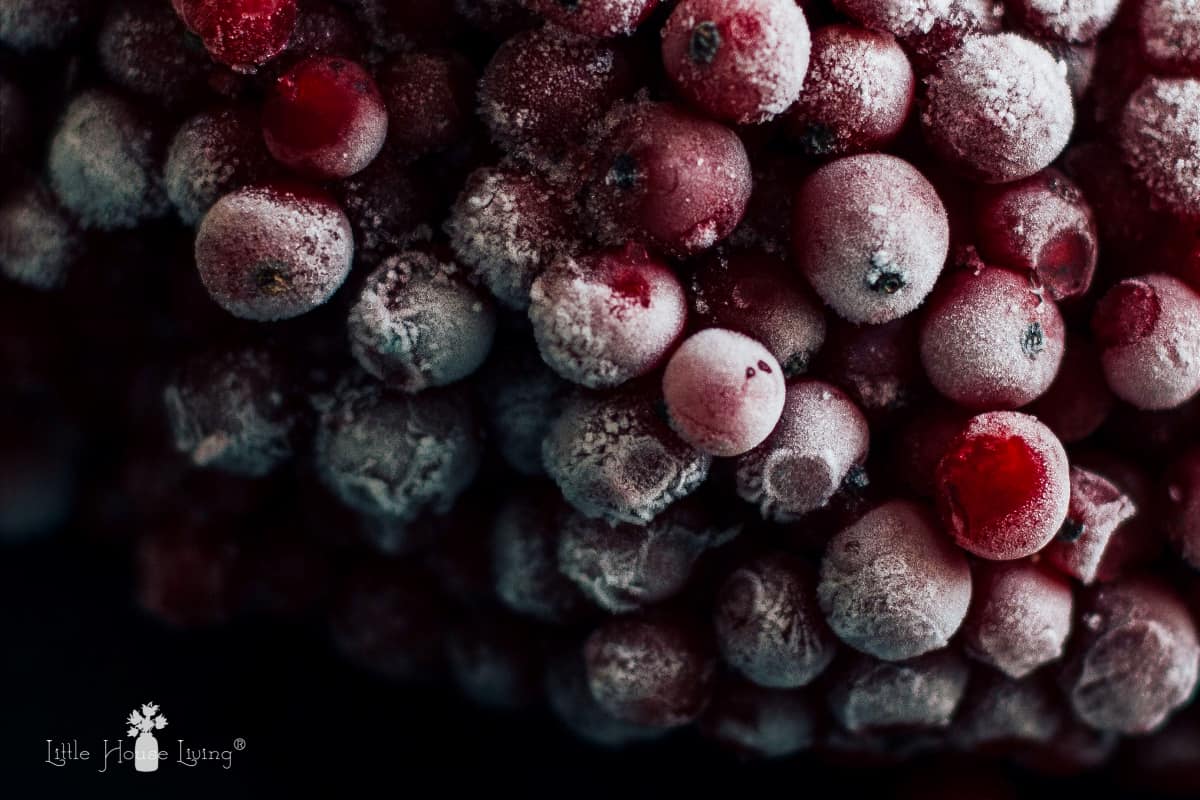
Expert Tips for Freezing
Need more tips on how to freeze your foods best and keep them fresh the longest? Here are all the expert tips from my own experience and other tips that I could gather up from reputable sources.
- Flash Freeze Freshness: Before stowing away produce or meat, lay them out on a baking sheet to freeze independently. This prevents clumps and keeps individual pieces easily accessible.
- Label and Date: Stick a label indicating what’s inside and the freezing date. Knowing how long something has been frozen maximizes safety and taste.
- Vacuum Sealing Victory: Invest in a vacuum sealer for meats and prepared meals. Removing the air extends shelf life and thwarts freezer burn.
- Appropriate Containers Matter: Store food in freezer-safe containers to prevent odors from infiltrating and protect against temperature changes.
- Organize by Category: Keep meats, vegetables, and baked goods in separate sections for easy inventory and to prevent cross-contamination.
- Temperature Consistency: Keep your freezer at a constant 0°F (-18°C) for optimal food preservation, and avoid frequent door opening to maintain the temperature.
- Chilling Times for Quality: Chill foods in the fridge before freezing to reduce temperature fluctuations that can affect food quality.
- Rotation Routine: Rotate older items to the front to use them first. First in, first out ensures you enjoy everything at its best.
- Defrosting Do’s: Always defrost food in the fridge or using a microwave’s defrost setting, not on the counter, to minimize bacterial growth.
- Know When to Say Goodbye: If you’re questioning the quality of something that’s been frozen for over a year, it’s often safer to dispose of it to prevent foodborne illness.
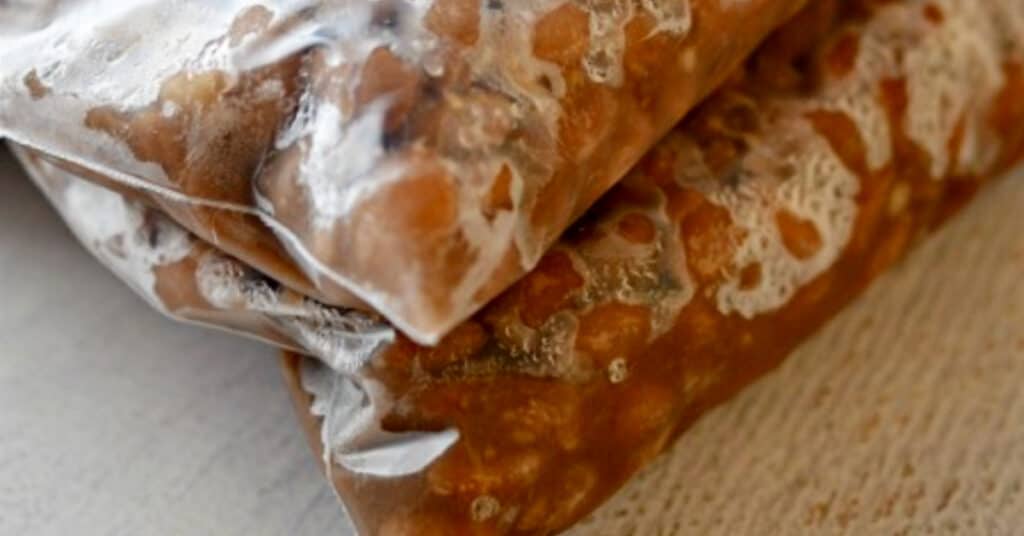
Your Freezer Experiences
Here are some other tips for freezing from other Little House Living readers that might be helpful for you as you work on keeping your foods fresh for as long as possible.
Leave your comments below so that I can add them here to this post!
Remembering these tips will ensure not just how long is meat good in the freezer, but also how good it tastes. It’s about safeguarding the essence of what we eat: the shelf life, the flavors, and the nutritional value. In our quest for convenience, let’s not compromise on quality. By learning a little more about food science, we can proudly state that our foods are as delectable as they are durable.
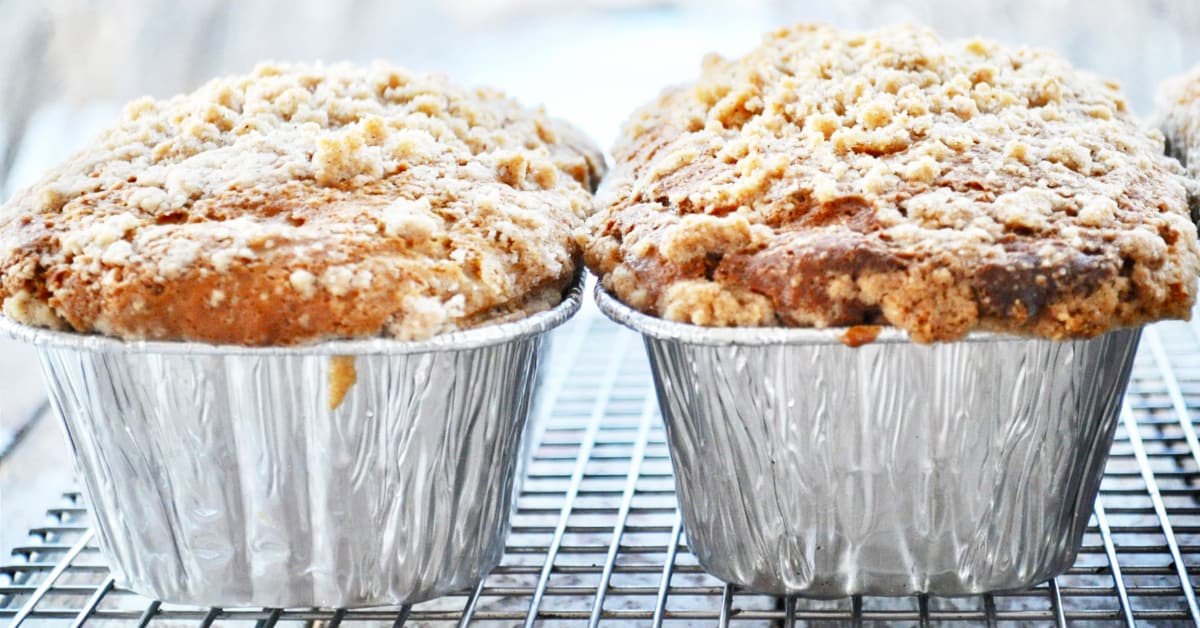
Extending Life in the Freezer
Almost all foods can extend their freezer life if you take specific steps before freezing. One of these steps is to use a vacuum sealer and seal up your freezer foods before freezing. This won’t be the best method for things like bread, but it’s great for fruits, vegetables, and meats.
Once an item has been vacuum sealed, it can last in the freezer for up to several years without getting freezer burnt. If you plan on storing quite a bit of food in the freezer, you might want to consider a vacuum sealer. I have this Geryon Vaccum Sealer (it was less expensive and had more options than the standard Foodsaver), but many people I know like to use the Foodsaver Brand Vacuum Sealers.
You can also watch a video of me using a vacuum sealer below to get an idea of how they work.
Printable Freezing Food Chart
Below, you can find a handy printable to remind you how long foods are good when stored in the freezer. Print out this freebie and place it in your Homestead Management Binder for a quick reminder when you need it.

Freezer Meal Ideas
- Freezer Breakfast Sandwiches
- Cheesy Chicken Crescents Freezer Meal Recipe
- Freezer Cooking in an Hour (Gluten Free & Real Food!)
- Cook Ahead Freezer Rice
- Freezer Beef N Bean Burritos
- Make Ahead Breadsticks
- Make Ahead Casserole – French Toast
Find more Make Ahead Meals here.
What am I missing on this list? In your experience, how long do some of these items last in the freezer? Do you still eat them even if you leave them in the freezer longer?

Merissa Alink
Merissa has been blogging about and living the simple and frugal life on Little House Living since 2009 and has internationally published 2 books on the topic. You can read about Merissa’s journey from penniless to freedom on the About Page. You can send her a message any time from the Contact Page.
This blog post on Freezing Foods was originally posted on Little House Living in April 2010. It has been updated with current information as of January 2024.



awesome! thanks =)
No problem:)
you stated on your video that you placed milk on sale in your freezer. I didn't see how long that would be good for, in fact I've never heard of it. Is it really possible to freeze it?
What about the milk you placed in the freezer? How long can you freeze milk?
I must be a little spacey, I can't believe I forgot to add that, got it up there now:) Yes, I freeze milk all the time. It works best if you freeze whole or 2% milk, those don't separate as much when you thaw them. Before you freeze it pour just a little out. Milk will expand when it freezes and you don't want it to explode. Then when you are ready to thaw it just get it out of the freezer and stick it in the fridge for several days. Try not to use it until it thaws all the way otherwise it will still be a little separated. Hope that helps!
I really enjoyed reading this article. Although I try to use frozen foods in a decent amount of time, I once came upon a beef roast that had been in the freezer of almost 6 years! Yes, years! I had wrapped it SUPER well originally and decided to see if it could be ‘saved’. There was absolutely no freezer burn on it that I could see, so I did roast it. Honestly, with no word of a lie, it was the BEST roast I had made!! ‘Course, would I do that again? Probably not. I am far more conscious about length of time now (and not as brave! – or ‘stupid’??). Thanks for a great article, Merissa. 🙂